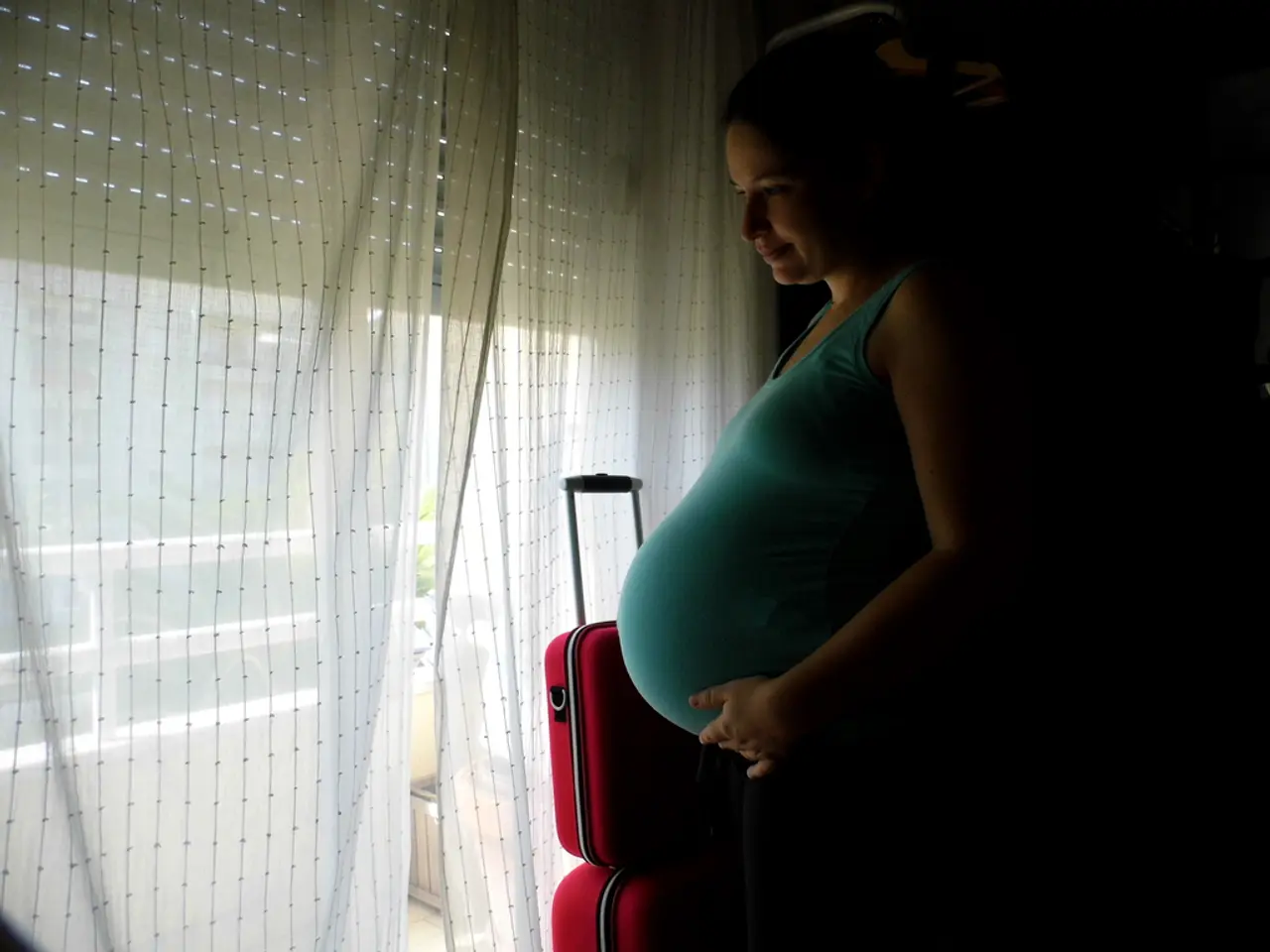Abdominal Discomfort in Late Pregnancy: Issues in the Third Trimester
During the third trimester of pregnancy, upper abdominal pain can be a cause for concern, as it may indicate several serious conditions that require prompt medical attention. Here's what you need to know about upper abdominal pain during pregnancy and when to seek help.
Upper abdominal pain can stem from various causes, including gas or constipation, liver problems, contractions, gallbladder issues, and acid reflux. However, in the third trimester, persistent or severe upper abdominal pain could be a sign of serious conditions such as HELLP syndrome, placental abruption, intrahepatic cholestasis of pregnancy (ICP), gallstones and pancreatitis, intra-amniotic infection (chorioamnionitis), spleen injuries, uterine rupture, spontaneous hemoperitoneum, or uterine or adnexal torsion.
HELLP syndrome is a severe form of preeclampsia characterized by upper right or middle abdominal pain, swelling of face and hands, nausea, vomiting, headache, blurred vision, and fatigue. Placental abruption involves premature separation of the placenta and can cause significant abdominal pain along with possible vaginal bleeding. ICP occurs in about 1% of pregnancies, usually in the third trimester, and involves blockage of the liver’s bile ducts, leading to intense itching (especially palms and soles), upper right abdominal pain, jaundice, nausea, dark urine, and pale stools. Both conditions pose risks to the fetus and require medical management.
Gallstones can cause sharp upper right abdominal pain, bloating, and nausea, sometimes leading to pancreatitis, which presents as dull upper abdominal pain radiating to the back with nausea and vomiting. Intra-amniotic infection (chorioamnionitis) is an infection of the fetal membranes and amniotic fluid characterized by fever, uterine tenderness, abdominal pain, maternal/fetal tachycardia, and contractions. Uterine rupture, spontaneous hemoperitoneum, uterine or adnexal torsion, and spleen injuries also require emergency care.
If a pregnant woman in the third trimester experiences persistent or severe upper abdominal pain, especially if accompanied by symptoms such as swelling, headache, visual changes, vaginal bleeding, fever, or severe nausea, she should seek immediate medical evaluation to rule out these potentially dangerous complications. It is important to consult a doctor or midwife about any unusual or very painful sensations in the upper abdomen during pregnancy.
While most causes of stomach or abdominal pain in the third trimester are not fully preventable, eating a healthful and balanced diet, getting regular exercise, and devising healthful strategies for managing stress can help alleviate some of the aches and pains of pregnancy. Stretching skin can cause an intense sensation in the upper abdomen, especially if the skin itches and feels tight. Constipation is a common pregnancy complaint, and by the third trimester, it can be exacerbated by the uterus putting pressure on the intestines.
True labor contractions typically start at the top of the uterus, causing an intense tightening sensation that becomes progressively more painful. Stomach pain is more common during the third trimester and may be accompanied by heartburn or a sensation of the skin stretching.
In conclusion, while upper abdominal pain during pregnancy can have various causes, persistent or severe upper abdominal pain in the third trimester may indicate serious conditions that require prompt medical attention. If you experience such symptoms, don't hesitate to seek immediate medical evaluation to ensure the health and safety of both you and your baby.
[1] American Pregnancy Association. (2021). Upper Abdominal Pain During Pregnancy. Retrieved from https://americanpregnancy.org/pregnancy-complications/upper-abdominal-pain-during-pregnancy/ [2] Mayo Clinic. (2021). Abdominal pain during pregnancy. Retrieved from https://www.mayoclinic.org/healthy-lifestyle/pregnancy-week-by-week/expert-answers/abdominal-pain-during-pregnancy/faq-20068478 [3] National Health Service (UK). (2021). Upper abdominal pain in pregnancy. Retrieved from https://www.nhs.uk/conditions/pregnancy-and-baby/upper-abdominal-pain-pregnancy/ [4] NHS Choices. (2021). Gallstones. Retrieved from https://www.nhs.uk/conditions/gallstones/ [5] Obstetrics & Gynecology. (2021). Evaluation of the Pregnant Patient with Severe Abdominal Pain. Retrieved from https://www.obgyn.net/obgynnews/home/article/11685-evaluation-of-the-pregnant-patient-with-severe-abdominal-pain
- In the context of pregnancy, predictive signs of serious conditions could be persistent or severe upper abdominal pain in the third trimester.
- A parent expecting a child may find upper right or middle abdominal pain as one of the symptoms of HELLP syndrome, a severe form of preeclampsia.
- Ex anticipating pregnancy complications, signs such as swelling, headache, visual changes, vaginal bleeding, fever, or severe nausea, accompanied by persistent upper abdominal pain, should prompt seeking immediate medical attention.
- Atopic dermatitis, a form of eczema, might not seem related to upper abdominal pain during pregnancy, but stress and changes in hormones can exacerbate both conditions.
- In the third trimester, the expectant mother might experience abdominal pain due to the pressure of the uterus on the intestines, resulting in constipation.
- Science has shown that acid reflux, known as GERD, can also cause heartburn and upper abdominal pain during pregnancy, particularly during the third trimester.
- If the pregnant woman is experiencing sharp upper right abdominal pain, bloating, and nausea, it could be a case of gallstones, which sometimes lead to pancreatitis.
- Frequent stress management and health-and-wellness practices might help reduce some pregnancy-related abdominal pains and pains associated with conditions like cholecystitis, a severe form of gallbladder inflammation.
- The healthcare provider may consider medications like Paxlovid for treating or managing some medical-conditions, but it is essential to discuss their potential risks and benefits during pregnancy.
- Contextual factors such as diet, exercise, and stress management play a significant role in managing various pregnancy-related symptoms, including non-emergency upper abdominal pain.
- The pregnancy complication chorioamnionitis, an infection of the fetal membranes, can present with abdominal pain, fever, maternal/fetal tachycardia, and contractions.
- Women's health is of paramount importance throughout pregnancy, and it's crucial to be aware of the risks associated with retargeting, a term used to describe serious abdominal pain in the third trimester, to ensure a safe delivery and the wellbeing of both the mother and baby.




